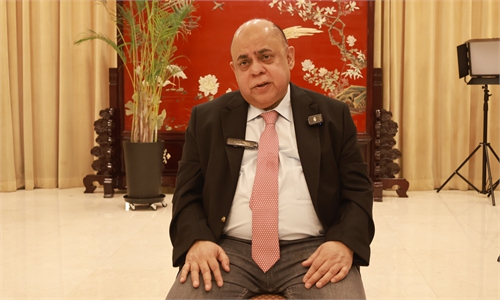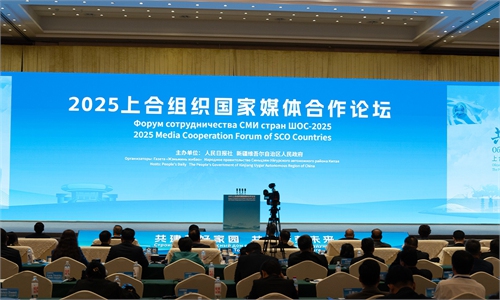IN-DEPTH / DIPLOMATIC CHANNEL
SCO prioritizes consensus-building and mutual respect, demonstrating multilateralism can thrive: Deputy Secretary-General
Strength in unity
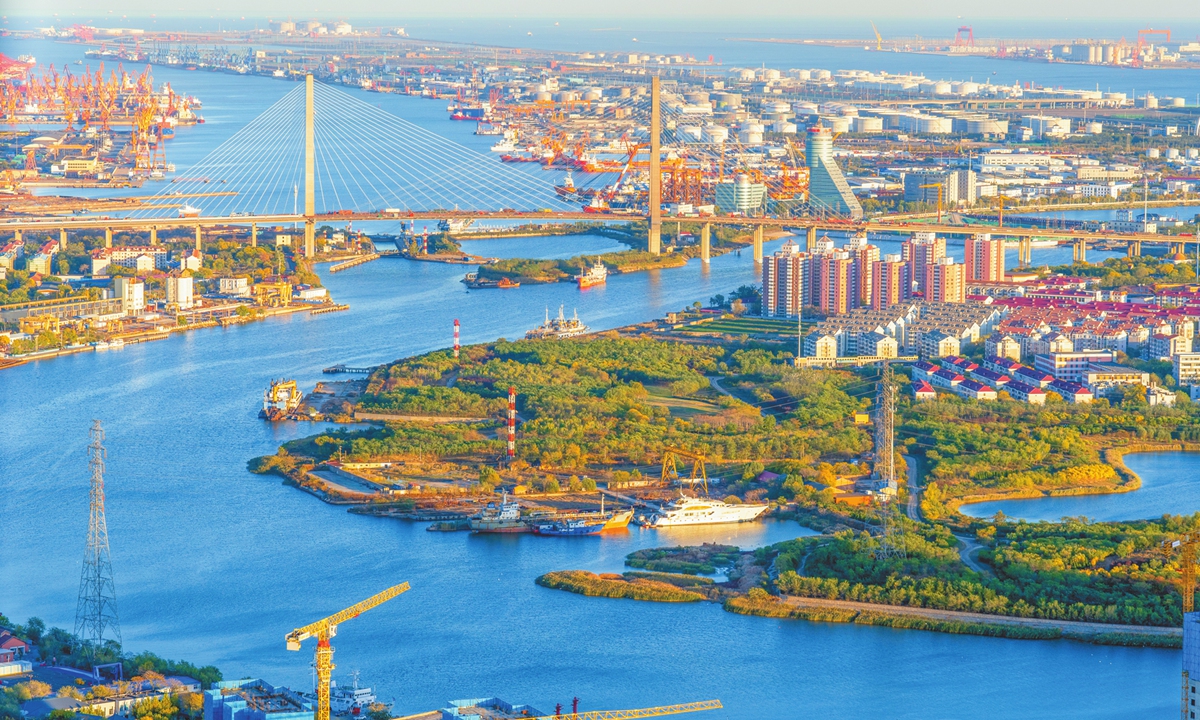
A view of North China's Tianjin Municipality Photo: VCG
Editor's Note:This year is SCO's "China Year." China will host the Shanghai Cooperation Organization (SCO) summit in Tianjin this autumn, according to China's Foreign Ministry, and now the world is tuned in. Will this gathering mark a new milestone for the organization? Against the backdrop of global geopolitical fractures and economic uncertainty, how will the SCO reshape regional integration? In an exclusive interview with Global Times (GT) reporters Lin Xiaoyi and Xie Wenting during the 2025 SCO Media Cooperation Forum in Urumqi, capital city of Northwest China's Xinjiang Uygur Autonomous Region, SCO Deputy Secretary-General Sohail Khan (Khan) revealed how the organization leverages its "Shanghai Spirit" to address 21st-century challenges. From China's pivotal role as rotating chair to the SCO's experiments in global governance, the interview paints a picture of the SCO amid ever-shifting geopolitical landscapes.
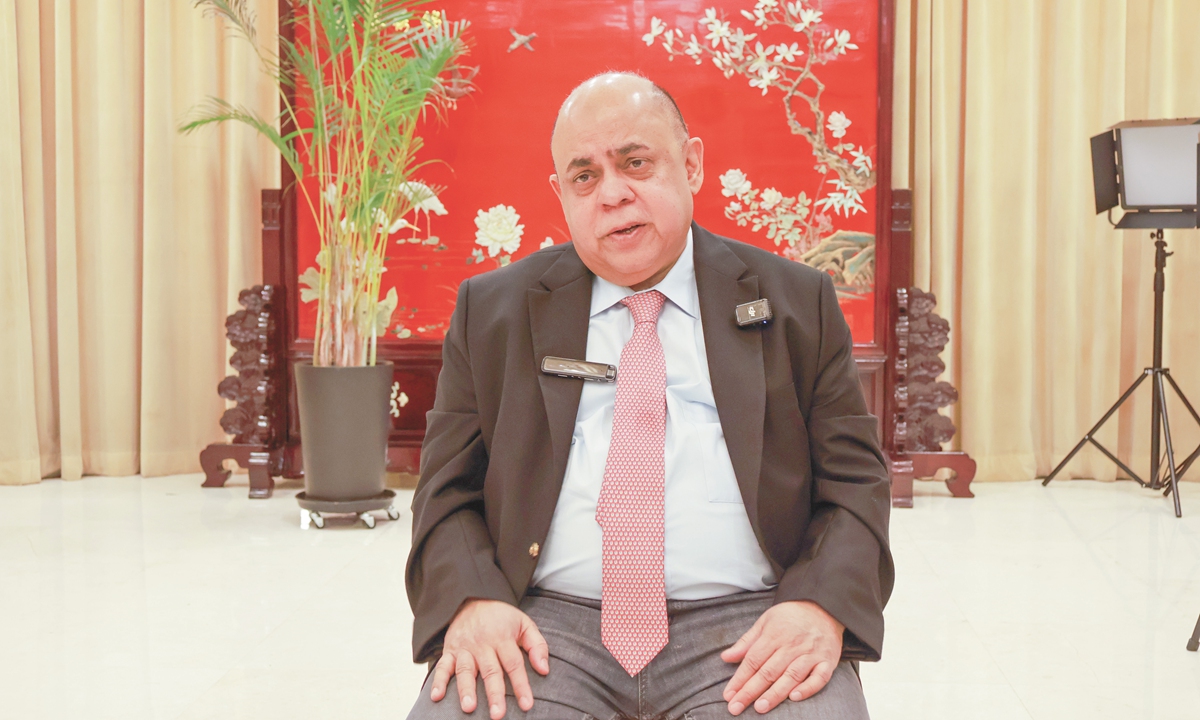
SCO Deputy Secretary-General Sohail Khan speaks during an interview with the Global Time in Urumqi, capital city of Xinjiang, on May 22, 2025. Photo: Lin Xiaoyi/GT
GT: The SCO summit is fast approaching. What is the current status of the preparations? What innovations or highlights can we expect from this year's summit?Khan: We are working very actively in the secretariat for this summit. We are placing a great deal of importance on this event because it is going to be historic. This time, we will also mark it as a landmark summit, as we celebrate two significant anniversaries: The end of WWII and the founding of the United Nations. That is why we are making extensive preparations and are actively involved in various mechanisms and spheres of cooperation.
In terms of innovation and highlights, we are considering the possibility of expanding our membership. Additionally, we are in the process of developing documentation that will be included in our declaration. As you know, each summit culminates in a declaration, and our experts are currently working on this important document.
China, as our current chair, is putting in significant effort to ensure that everything runs smoothly. Whenever things go into the hands of the Chinese people, you can feel relaxed because things will be done.
In the economic sector, we are working on several initiatives related to investments and the potential creation of a bank, as well as exploring financial and fiscal strategies to support the projects we are evaluating. We are also considering the possibility of enhancing electronic trade and e-commerce to further simplify them. These initiatives are being developed alongside our efforts to strengthen trade and economic relations through transportation and energy. We have an energy strategy and plan in place, which was presented by Kazakhstan in 2024 at the summit. This year, China is contributing to this plan. Energy ministers are scheduled to meet to finalize this program. Furthermore, our finance ministers and the heads of central banks will convene meetings in Beijing. These meetings will result in recommendations for policies that will be submitted for approval.
GT: How do you view China's efforts in deepening multilateral practical cooperation and assisting more countries to explore poverty alleviation and sustainable development paths that align with their national conditions within the SCO?
Khan: Poverty alleviation is an important mechanism for SCO countries. We are trying to learn from China's experience and the experiences of other countries, bringing them together to create a policy document for member states to follow. This document will not only serve as a guideline, but will also provide practical assistance on how to eliminate poverty and promote poverty alleviation. I visited a city in Yunnan Province for this purpose, and what I observed was that road construction in once poverty-ridden areas, along with the local government's efforts in producing medicines and other economic activities, plays a vital role. The involvement of local governments and the participation of people at the district and village levels are crucial. What China has accomplished can be replicated in other countries that wish to adopt these practices sustainably.
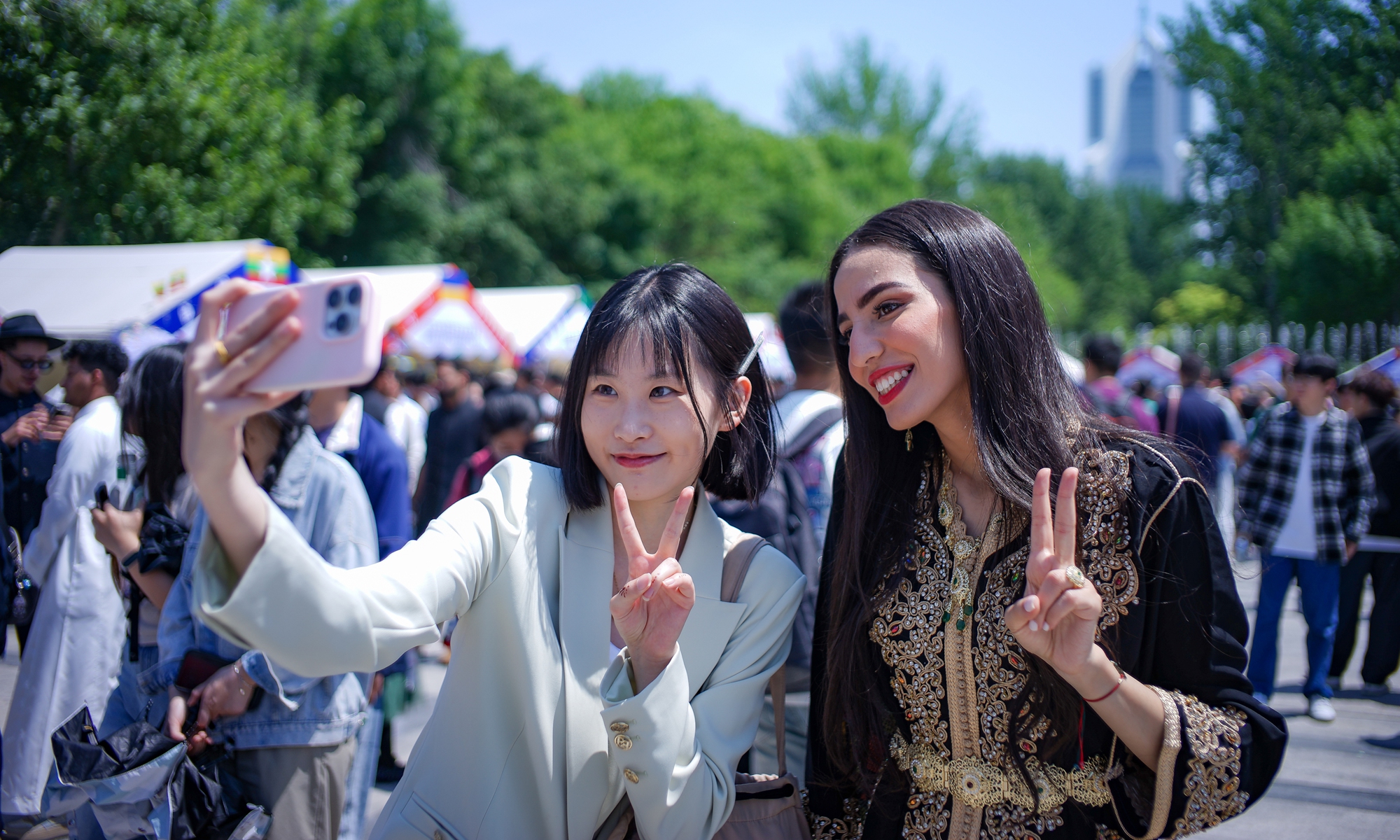
Visitors pose for a photo together during an SCO-themed cultural event in Tianjin, on May 10, 2025.Photo: VCG
GT: In recent years, the global geopolitical landscape has changed dramatically. What are the main focal points of the SCO's recent work? Has there been an adjustment in the direction of priority development?Khan: Currently, we are facing new challenges, as we observe the emergence of a new world order. This is not the only change happening in the world. Some people say the world has already changed, while others argue that it is in a state of evolution. Regardless, the world is no longer a bipolar one, as it was after WWII. We must adjust to these changes. This is why regional organizations like the SCO are gaining importance; people tend to believe more in regional solutions because they can better address the specific problems, issues, and challenges faced by regional populations. Some regions struggle with water scarcity, others face agricultural issues, while some deal with industrial problems or security concerns. These challenges are interconnected, and it is more feasible to manage them collaboratively on a regional level.
Currently, we are focusing on the policy guidelines aspect of our work. Our efforts are concentrated on the theoretical side, specifically on how to transform the transportation system of SCO countries. We are prioritizing basic infrastructure development, as we believe that once transportation systems are established, business opportunities will follow. With 26 countries involved, collaboration is essential; it requires mutual trust. I am hopeful that through our efforts, we will be able to achieve our targets.
GT: The SCO advocates for the "Shanghai Spirit." What is the practical significance of these values in the current international environment?
Khan: The "Shanghai Spirit" of inclusiveness and non-confrontation holds particular relevance today. In a world marked by increasing geopolitical divides, the SCO's approach provides a constructive alternative: By prioritizing consensus-building and mutual respect, we demonstrate that multilateralism can thrive without resorting to adversarial dynamics.
In terms of regional governance, we envision a future where the SCO could establish institutions analogous to global frameworks - such as a regional development bank or funding mechanisms similar to the IMF. These structures would not only strengthen regional economic integration, but also serve as a bridge between local and global governance systems. The SCO does not seek isolation; rather, we believe in fostering synergies between regional cooperation and global engagement.
GT: In the area of regional security, how is the SCO addressing both traditional and emergent security challenges?
Khan: The SCO has established a robust institutional framework to tackle security challenges. At the core of this effort is the Regional Anti-Terrorist Structure (RATS), headquartered in Tashkent, Uzbekistan. This specialized body is dedicated to coordinating joint operations, information sharing, and capacity-building measures against terrorism, extremism, and transnational crime.
Within the SCO secretariat, the political department actively engages with RATS and member states to facilitate strategic discussions on security priorities. This collaborative approach ensures a unified response to both traditional threats - such as border security and military coordination - and emergent challenges like cybercrime and drug trafficking.
It is essential to note that security lies at the heart of the organization's founding purpose. The SCO was initially established to address regional security concerns, and this mandate remains central to our mission. Through continuous dialogue, joint exercises, and operational cooperation, we strive to create a secure environment that serves as the foundation for regional stability and sustainable development.

An international student from Xinjiang University writes a message in the guestbook at an exhibition hall in Kuqa county in Aksu Prefecture, Northwest China's Xinjiang Uygur Autonomous Region, on May 24, 2025. Photo: Zhou Yang/GT
GT: In your opinion, which economic sectors hold the most potential for cooperation in promoting the common development of SCO countries?Khan: In my opinion, the basic economic sector should be transportation. Once transportation is operational - when trains, buses, and trucks are moving - goods can flow more freely. I know that some trade is already taking place between China and Central Asia, as well as between South Asia and Central Asia, through the existing connectivity, but it is not enough. We need to enhance connectivity by building more roads, highways, and railways to move forward. The ultimate goal is to promote greater openness; if we are open to trade activities and economic activities through e-commerce or e-trade, we can achieve this.
E-commerce refers to consumer transactions, such as purchasing items on e-commerce platforms, while e-trade involves transactions between stock exchanges and banks, including the buying and selling of bonds and other valuable state-level assets. In short, this means that the economic mechanisms we are developing here, such as our energy strategy and plan, are crucial. I have an idea for a common electricity grid - an SCO grid - through which each country that produces surplus electricity can contribute and sell electricity to countries like Pakistan or Kyrgyzstan, which have deficits in electricity, or to other nations in need.
I believe that water is an important issue for the future, and some member countries should take the initiative for water cooperation. Additionally, there are many economic zones where no taxes are enforced, yet they remain underutilized. Therefore, there should be an organization or institute that can sit down and identify where to invest or initiate these kinds of investments. One thing I would like to emphasize is the need for training programs to elevate our people to the same level. We need to ensure that we have the necessary human resources in place.
Regarding global issues such as digitalization and climate change, we have a significant mechanism for digitalization that we are currently developing. As I mentioned, e-commerce, e-trade, and what we refer to as the green economy are all emerging areas of focus. Green technology and green industries are integral to our future work within the SCO, and China is the main driver and source of these ideas. We are looking to China for a strong push in this direction.
GT: In recent years, the SCO has continued to expand its membership. Does the addition of new members pose challenges to existing decision-making efficiency and internal coordination mechanisms? How can the organization balance "expansion" with "enhancement of effectiveness"?
Khan: The expansion of an organization is a good thing - like having a bigger party where everyone celebrates together, brings forward more ideas, and collaborates for mutual support. The future of the SCO is very bright. Our task is to "beautify our house" - that is, to ensure internal coherence. This requires time to align all members to the same level of understanding and shared vision.
Multilateralism, by nature, demands unity through the principle of consensus. We must respect every member state's national position equally. This approach inherently takes time, as multilateral processes are never instantaneous, but they lay the foundation for future prosperity. Everything we do is oriented toward the future. We cannot dismiss differing views; instead, we foster dialogue to build understanding. This is crucial for bringing together even those with historical differences, promoting regional peace, stability, and a cooperative atmosphere.

